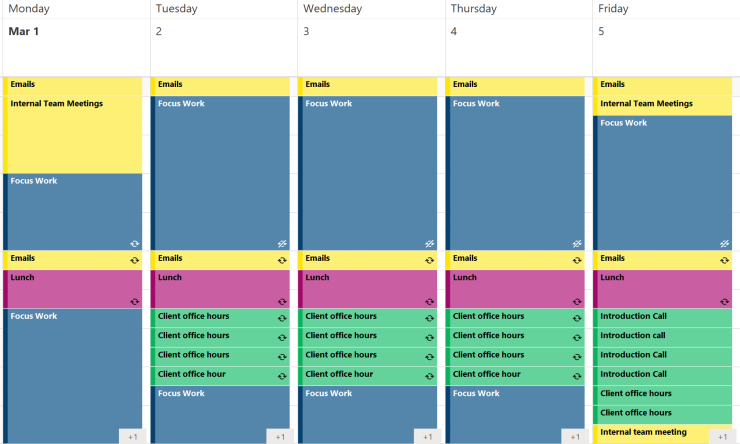What happens during tax season? You have an incredible amount of work to do and clients are bombarding you with an endless stream of unscheduled “quick questions.” Meanwhile, busy season is also when prospective clients really want to talk to you to see if your firm is a good fit for them. How do you find time to serve existing clients, bring in new clients, and still do the work?
It’s not easy. However, making a conscious effort to take control of your calendar can go a long way toward preserving your sanity. I’m not talking about scheduling yourself down to one-tenth of an hour. I’m talking about strategically compartmentalizing your calendar so you’re only doing certain types of activities at certain times of the day — the times when you’ll be most effective at each task.
You can’t be all things to all people every hour of the day. You have to allocate specific blocks of time in your calendar to accomplish certain activities and only those activities such as these:
- Answering client questions and nothing else (say 8 a.m. to 10 a.m.);
- Taking introductory calls from new prospects (say 1 p.m. to 3 p.m.); and
- Doing focused (no distraction) work (say 10 a.m. to 12 noon and 3:30 p.m. to 6:30 p.m.).
Everyone is wired differently. You may have to experiment to see which times of day (and which days of the week) are best for you to do certain types of work. Here’s how my calendar often looks during busy season:

I know what you’re thinking: When there’s too much to do and not enough time to do it, it’s easy to fall into the multitasking trap. Sometimes you have to multitask when there are client fires to put out. But most of the time multitasking is a trap.
Even when you’re really pressed for time, it’s better to stay focused on a single task. “Monotasking” will help you get more done in the long run than multitasking will — with much better client outcomes.
As your clients’ most trusted advisor, don’t you owe them your full attention?
How well can you do on this simple multitasking test?
Here’s a simple brain test to show you what I mean:
Test 1, Multitasking: Write down each letter of the alphabet and its corresponding number next to it. (For instance, A1...B2...C3...D4, all the way to Z26.) Record how long it took you to complete this test.
A1
B2
C3
D4
…
Z26
Test 2, Monotasking: First write down each letter of the alphabet in order, and then write the numbers 1 through 26 in order. Record your time and compare to Test 1.
1
2
3
4
5
6
…
26
If you’re like most CPAs, you completed Test 2 (Monotasking) 33 percent to 50 percent faster than you completed Test 1 (Multitasking).
Think about how much more effective (and sane) you could be with 33 percent to 50 percent more time in your calendar. That’s why I’m such a stickler for compartmentalizing my calendar into very specific intervals of monotasking time.
Over time, you’ll realize you’re much more efficient at doing certain tasks at certain times of the day. For instance, if you’re not a morning person, don’t schedule focused work the moment you arrive at the office. However, if you’re an early riser, don’t schedule focused work or important client meetings late in the day when your energy starts to fade. The key is that you decide when to do each type of work on your plate, not the outside world.
Trust me, you will find it empowering to take control of your calendar. Before you know it, you’ll be getting more done in less time because you won’t be so distracted or mentally fatigued. In essence, you decide what busy season looks like for you, not your clients, your prospects or even your team members.
Monotasking is a strategic decision while multitasking is more reactionary. Ask anyone who has been in a war zone or emergency room and they’ll tell you that you can’t be in reactionary mode all the time. The stress will eventually wear you down.
Don’t underestimate the importance of personal time
Finally, it’s important to build personal time into your calendar. You can’t work straight through from 7 a.m. to 10 p.m. every day without a break. You need to eat lunch. You need to get some fresh air and exercise. And yes, you need to answer email. I like to set three specific times every day for email, Slack and text messages — say 8 a.m., 12 noon and 6 p.m. You can’t be checking messages all day long. Stick to the three predefined windows and otherwise, turn off your inbox and alerts so you can stay focused.
We can’t control the overall volume of work during busy season, but we can control how, if we address it. When it comes to taking control of your calendar, make sure you communicate this approach to your staff and your fellow partners. Doing so makes you more effective and you won’t feel like you’re at their beck and call 24/7.
Control vs. chaos: It’s up to you how Busy Season 2021 turns out.





